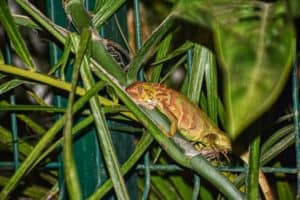Iguana Removal Jupiter

These reptiles can also destroy habitats and food sources of some of South Florida’s endangered species. Florida Fish and Wildlife Commission is actively encouraging owners of residential and commercial properties to eliminate this nuisance wildlife.
Iguana Control of Jupiter, FL, provides iguana trapping services and removal services from commercial and residential properties.
In South Florida, there are three main iguana species:
- Common Green Iguana
- Black Spiny-Tailed Iguana
- Mexican Spinytail Iguana
Iguana Trapping Near Your Jupiter Home
The most common type of iguana found in Jupiter, FL, is the green iguana. They are usually a shade of green, especially as juveniles, and occasionally they can darken to a darker brown or black shade. Throughout the mating season, the adult males can take on a colorful orange hue. Down the center of a green iguana’s body and along the top portion of its tails, there is a row of spikes.
Adult male iguanas develop prominent jowls with a throat fan that they use to woo female iguanas, regulate their body temperature, and scare predators off. Green iguanas are excellent climbers and can climb just about anything. They are also excellent swimmers and can run quickly. If a green iguana falls, it can survive a 40-foot plunge to solid ground.
A male green iguana typically weighs around 17 pounds and can be well over 5 feet long. Females, however, rarely exceed the 7-pound mark. The Florida State green iguanas’ food of choice is tender young leaf shoots, foliage, and flowering plants and blossoms.
While iguanas are mostly herbivores, they will occasionally eat dead animals and bird eggs. Juvenile iguanas occasionally eat insects or tree snails, which are considered an endangered species.
Nuisance Wildlife Rangers Use Pet Food for Wildlife Removal
When given a choice, an iguana will eat the leaves of an ornamental plant because it contains a higher protein level with less cellulose, allowing it to digest the leaves more easily. Some of the plants most enjoyed by iguanas tend to be the more commonly used ornamental plants in South Florida including:
- Impatiens
- Nasturtiums
- Roses
- Orchids
- Hibiscus
- Most flowers and fruits
- Garden greens such as beets, broccoli, kale, collard greens, mustard, greens, and lettuce
Iguanas are prolific breeders. They typically live around 10 years in the wild. A female green iguana begins to lay eggs around two years of age and typically lays somewhere between 35 and 70 eggs each time. South Florida is the perfect living area for green iguanas and other iguanas due to its lack of predators, lush and dense landscapes, and warm, tropical climate.
Green iguanas are not cold hardy, and any time a winter cold air sneaks into the South Florida area, the iguanas become completely immobilized and fall from their perches. This is, however, a paralysis that is only temporary. Once their bodies warm back up, they wake up again.
Damage Caused by Iguanas in Jupiter, FL
Iguanas in Jupiter, Florida, have caused losses worth millions of dollars. With Florida being a tourist destination, restaurants and resorts often promise a tropical experience.
Still, they must protect their shrubs and foliage and their golf course fairways and greens from iguanas on a daily basis.
- Damage to crops and landscaping: Iguanas will eat berries, bananas, lychee, tomatoes, and mangos, and destroy foliage.
- Iguana burrow damage: Iguana burrows can be up to 80 feet long, where iguanas feel it is a safe place to lay their eggs. These burrows can compromise the foundations of sidewalks, buildings, and Jupiter’s dam and canal system.
- Iguana droppings: Iguanas reside in trees and burrows but also bask in the sun of a deck or patio and moored boats. Their droppings can cause health risks to the public if left in close proximity to humans and pets.
- Disruptions to endangered and native species: Iguanas in Jupiter, FL, have been observed forcing the protected species of Florida Burrowing Owls from their burrow. The Miami Blue Butterfly, also an endangered species, may be at risk due to iguanas eating the nickerbean plant that hosts this rare butterfly.
How to Keep Iguanas at Bay
As a homeowner or commercial property owner in Florida, you have options for preventing iguana infestations. Oftentimes, small and simple changes can be effective.
- Never feed the iguanas.
- Keep iguanas out of vulnerable or valuable plants by encircling them with a screen or cage.
- Placing sheet metal at the bottom of the tree and around the trunk to a height of roughly 18 inches will prevent an iguana from climbing. Adding sheet metal to dock pilings could also help keep them from climbing up onto your dock.
- Iguanas that are burrowing or digging on your property can be stopped by burying wire barriers several inches below the ground. Some property owners will install an electric fence to prevent the iguanas from climbing walls.
- Florida Fish and Wildlife Conservation Commission says that you are able to spray the iguanas with the water hose to force them to leave your property, scare them away using loud noises, or use CDs hung from a tree to reflect light in an unusual way.
- Habitat modification can be viewed as an extreme iguana prevention method, but in certain cases, it might be justified. Altering your landscape can disincentivize iguanas from wanting to reside on your property. Removing rock piles or thick foliage where iguanas like congregating and filling the iguanas’ burrows can deter iguanas.
How to Get Rid of Iguanas
Business owners and homeowners are encouraged to take action when iguanas are on their property. Every iguana species may be captured or humanely killed without a permit on private property.
Iguanas are protected under general animal cruelty laws, stating that they must be dealt with respectfully and humanely. If you opt to capture and trap an iguana, please know that in Florida it is illegal to relocate or sell them.
Traps must be checked every 24 hours, and iguanas must be humanely euthanized. To be considered humane, the animal must die immediately.
Depending on local restrictions and your location, an iguana can be shot with an air pellet gun or firearm. Iguanas will bite in defense of themselves. You cannot attempt to use poison to bait an iguana. Florida is strict in enforcing wildlife removal laws.
Cost to Remove Iguanas
Removal of iguanas in Palm Beach County will vary based on the size of the job as well as many other factors. The size of the iguana invasion, how intricate the landscape is, the presence of juvenile iguanas, or a nest that has eggs on the property are all contributing factors when determining the price of removal.
Once the removal of these pests is complete, it is suggested to use habitat modification services to prevent another invasion of this nuisance pest.
Pest Control for Florida Iguana
With its lush landscapes and tropical beauty, Florida gives wildlife control officers and pest control operators many exciting and unusual experiences. Iguana Control stays adaptable and flexible in order to address the needs of our neighbors and customers.
We work hard to protect Jupiter, FL, from this invasive species. Contact Iguana Control today for a free estimate.
Other Locations in Palm Beach County
Ready To Get Started?
We're ready to answer all of your questions regarding your iguana control needs.

